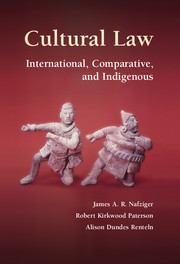Book contents
- Frontmatter
- Contents
- Preface
- Acknowledgments
- 1 Cultural Law: An Introduction
- 2 Culture and Law: The Basics
- 3 Cultural Heritage Law: Introduction
- 4 Cultural Material: Protection and Cooperation
- 5 Cultural Material: Rectification, Criminal Justice, and Dispute Resolution
- 6 Intangible Cultural Heritage
- 7 Museums
- 8 Sports
- 9 Religion
- 10 Language and Linguistic Expression
- Index
8 - Sports
Published online by Cambridge University Press: 05 June 2012
- Frontmatter
- Contents
- Preface
- Acknowledgments
- 1 Cultural Law: An Introduction
- 2 Culture and Law: The Basics
- 3 Cultural Heritage Law: Introduction
- 4 Cultural Material: Protection and Cooperation
- 5 Cultural Material: Rectification, Criminal Justice, and Dispute Resolution
- 6 Intangible Cultural Heritage
- 7 Museums
- 8 Sports
- 9 Religion
- 10 Language and Linguistic Expression
- Index
Summary
In this chapter, we examine the exciting cultural activity of sports competition. Before we turn to the legal framework, it will be useful to place sports in a larger context of play, games, and recreation. It also is useful to ask about the consequences of classifying a particular activity as a recreation or sport by contrast to some other form of activity. We will see that a classification we may take for granted is actually culturally conditioned.
David Parlett, The Arts of Contest, inAsian Games: The Art of Contest 23–24, 27 (Asia Society 2004) (reprinted with the permission of the Asia Society)
We might begin by asking[,] “What is a game?”…[A] glance at any substantial dictionary will uncover a long list of intuitively but not analytically related usages. They include triviality (“This isn't a game”), scheme or intrigue (So that's your little game!”), pursuit (“The game's afoot, Watson!”), object of pursuit (“Big game hunter”), prostitution (“On the game”), performance of a game (“My game's a bit off today”), and target score (“Game is 121 points”). Eric Berne's book Games People Play is a psychological study of “social transaction”; James Carse's Games Finite and Infinite is an exercise in theology. “Game theory” started life as a mathematical model of economic behavior, and has been extended to a variety of practical and academic studies, but offers little of interest to the players of real games like faro or football. About the only thing these uses have in common is some underlying concept of purposeful activity, except in ironic mode, when with equal facility they come to connote purposeless activity.
- Type
- Chapter
- Information
- Cultural LawInternational, Comparative, and Indigenous, pp. 740 - 830Publisher: Cambridge University PressPrint publication year: 2010

